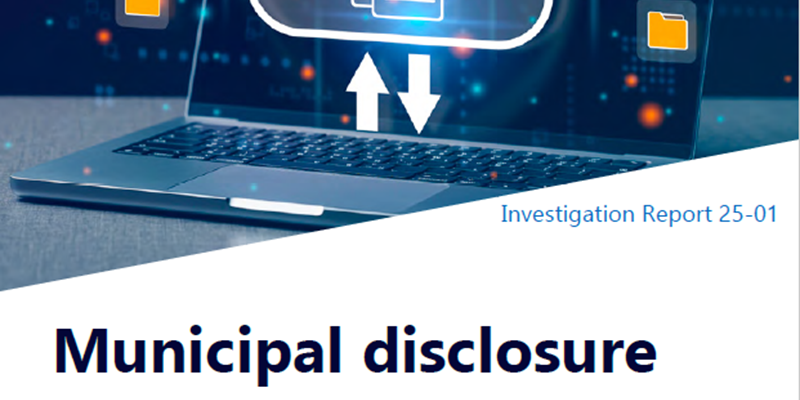Investigation Report 25-01: Municipal disclosure of records

Commissioner's Message
Our democracy depends on trust between governments at all levels – federal, provincial and municipal – and the people they serve. That trust is not a matter of faith and, in these increasingly polarized times, it’s far from guaranteed.
Our access to information is at the heart of transparency and accountability. By making as much of the information they hold as available as possible, public bodies empower people to better understand the decisions that impact their lives, to ask questions, to take action – in other words to fully and meaningfully participate in our democracy. It’s not about an administrative checkbox – it’s about committing to a culture of transparency, one that is reflected in the design of every piece of legislation, policy or program.
We launched this investigation into BC municipalities’ disclosure of records in response to concerns about how municipalities were handling their access to information obligations. Our team analyzed responses from municipalities across the province to questions about their record-handling practices, including their administration of the application fees, their proactive disclosure practices, and the records they make available for purchase.
The picture that emerged was a patchwork of inconsistent approaches to records releases
Some differences may be inevitable given the size and resources among municipalities in BC; however, there is a lack of consistency across the province in what types of records are made available proactively without an FOI request, made available for purchase, or through regular FOI processes. That inconsistency, particularly in determining what records should be made available for purchase, may contribute to a lack of trust in municipal government transparency.
There is an opportunity here for the provincial government to clearly define what records can be made available for purchase. In the meantime, I call on municipalities to carefully consider every record they hold, and carefully consider whether records should be released proactively as a matter of routine without an
access to information request, through the freedom of information process, or made available for purchase.
This report also includes recommendations for municipalities to ensure that if they are charging an FOI application fee, that they are doing so fairly, without adding additional
barriers to the process. The report also recommends that municipalities invest in training to educate staff of their obligations under FIPPA.
Why is it important that municipalities rethink their records practices, with a focus on accessibility and transparency? We need only look out our own front doors to answer
that question. Municipal records tell the stories of the communities around us, from the development and zoning decisions that shape our neighbourhoods to the evolution
and application of bylaws, to infrastructure planning and environmental assessments, and countless other services that impact our lives every day. I encourage municipalities to reflect on the findings of this report to strengthen their commitment to transparency and accountability as they carry out their vital work.
To read the full report: https://www.oipc.bc.ca/documents/investigation-reports/2916
To read the news release: https://www.oipc.bc.ca/documents/news-releases/2917
To view a video on the report: https://youtu.be/_aeaJ8jNWgE
To read guidance on proactive disclosure: https://www.oipc.bc.ca/documents/guidance-documents/2914
To read an overview of the report: https://www.oipc.bc.ca/documents/infographics/2918





